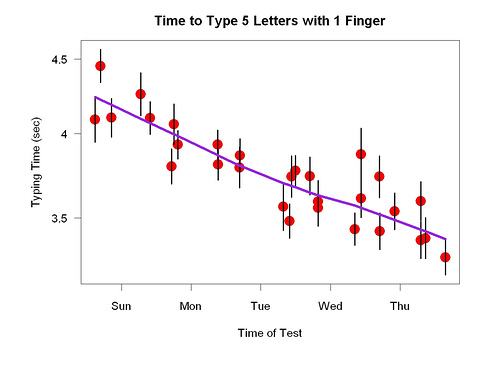Noticing that flaxseed oil improved my balance led me to measure its effects on other tests of brain function. It also made me wonder what else in my life affected how well my brain works. Eventually I measured the mental effects of flaxseed oil with four tests, but each had problems:
- Balance. Time-consuming (15 minutes for one daily test), not portable.
- Memory search. Anticipation errors, speed-accuracy tradeoff.
- Arithmetic. Speed-accuracy tradeoff.
- Digit span. Insensitive.
“Speed-accuracy tradeoff” means it was easy to go faster and make more errors. It wasn’t easy to keep the error rate constant. If I got faster, there were two possible explanations: (a) brain working better or (b) shift on the speed-accuracy tradeoff function. The balance and digit span tests had other weaknesses. Only the balance test was enjoyable.
I’m still doing the arithmetic test, which has been highly informative. However, I want to regularly do at least two tests to provide a check on each other and to allow test comparison (which is more sensitive?). I tried a test that involved typing random strings of letters several times but as I got faster I started to make many mistakes.
I have recently started doing a test that consists of one-fingered typing of a five-letter string. There are 30 possible five-letter strings. Each trial I see one of them and type it as fast as possible. 15 trials = one test. Takes three minutes.
I am doing one-finger rather than regular typing because I hope one-finger typing will be more accurate, very close to 100%. With the error rate always near zero, I won’t have to worry about speed-accuracy tradeoff. Another reason is the need for skilled movement and hand-eye coordination. Doing this sort of task can be enjoyable. One-finger typing (unlike regular typing) is skilled movement with hand-eye coordination; maybe it will be fun.
I restricted the number of possible letter strings to 30 to make learning easier. Yet 30 is too large to cause the anticipation errors I might make if there were only a few strings.
Here are early results.

So far so good. Accuracy is high. On any trial, it isn’t easy to go faster, so speed-accuracy tradeoff is less of a problem. Even better, it’s vaguely enjoyable. Doing the task is a little like having a cup of tea. A pleasant break. There’s no need to do the test four times/day; I just want to.
Since this post is loosely related to self-experimentation I’ll post this. I thought of you today watching the Discovery Science channel show on jellyfish. I looked up the incident on Wiki for you:
In 1964, Dr. Jack Barnes confirmed the cause of the syndrome to be due to a small box jelly, the Irukandji jellyfish (Carukia barnesi). In order to prove that the jellyfish was the cause of the syndrome, he captured one and deliberately stung himself, his son, and a local lifeguard, and observed the symptoms.[3]
https://en.wikipedia.org/wiki/Irukandji_syndrome